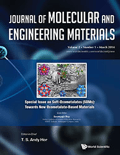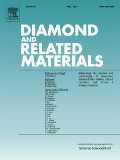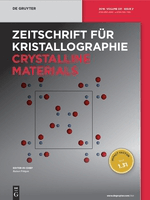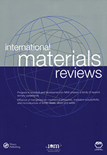
Journal of Molecular and Engineering Materials
Scope & Guideline
Catalyzing Progress in Materials Engineering and Molecular Research
Introduction
Aims and Scopes
- Molecular Design and Synthesis:
The journal focuses on the design and synthesis of novel molecular materials, including polymers, nanoparticles, and hybrid materials, aimed at achieving specific functional properties. - Characterization Techniques:
Research published in the journal often employs advanced characterization methods, such as X-ray diffraction, electron microscopy, and spectroscopy, to elucidate the structural and functional attributes of materials. - Applications in Engineering:
The journal highlights the practical applications of molecular materials in various engineering fields, including electronics, energy storage, catalysis, and biomedical engineering. - Theoretical and Computational Studies:
A significant portion of the research involves theoretical modeling and computational simulations to predict material behavior and guide experimental efforts. - Sustainability and Green Chemistry:
The journal promotes research that emphasizes sustainable practices in material synthesis and application, including green chemistry approaches and the use of renewable resources.
Trending and Emerging
- Nanomaterials and Nanocomposites:
There is an increasing emphasis on the synthesis and application of nanomaterials and nanocomposites, driven by their unique properties and potential in various engineering applications. - Biocompatible and Biomedical Materials:
Research on materials intended for biomedical applications, including drug delivery systems and bioactive materials, is on the rise, reflecting the growing intersection of materials science and healthcare. - Green and Sustainable Synthesis:
A trend towards environmentally friendly synthesis methods, such as green chemistry and biosynthesis, is gaining traction, aligning with global sustainability goals. - Functional Coatings and Surface Modifications:
There is a notable increase in studies focusing on functional coatings and surface modifications to enhance material properties, particularly in electronics and biomedical fields. - Machine Learning and AI in Materials Science:
The integration of machine learning and artificial intelligence for predicting material properties and optimizing synthesis processes is emerging as a significant trend in recent publications.
Declining or Waning
- Traditional Material Characterization:
While characterization remains crucial, themes focusing solely on traditional methods without integration of newer techniques or interdisciplinary approaches are less frequently addressed. - Single-Function Materials:
Research centered on materials with a single functionality is declining, as there is a growing trend towards multifunctional materials that can serve multiple purposes simultaneously. - Basic Theoretical Studies:
Papers that focus solely on basic theoretical studies without practical applications or experimental validation are becoming less common, as the journal emphasizes applied research. - Limited Scope of Applications:
There is a noticeable decline in studies that only cover niche applications, as the journal encourages broader applicability and relevance of materials in various industries.
Similar Journals

Molecular Systems Design & Engineering
Pioneering Research at the Intersection of Chemistry and EngineeringMolecular Systems Design & Engineering, published by the esteemed Royal Society of Chemistry, stands at the forefront of interdisciplinary research focused on the integration of molecular systems and engineering principles. With its ISSN 2058-9689 and a robust impact within various scientific domains, this journal not only facilitates the advancement of knowledge in fields such as Biomedical Engineering, Chemical Engineering, and Materials Chemistry, but also fosters collaborative innovations that address contemporary challenges in energy and manufacturing processes. Its recent rankings, including Q1 categorization in Critical areas of Chemical Engineering and Materials Chemistry, underscore its significance and influence within the scientific community, making it a vital resource for researchers, professionals, and students alike. Access options are available to meet diverse reader needs, encouraging wider dissemination of groundbreaking findings and methodologies that enhance the design and application of molecular systems.

MRS Advances
Fostering Interdisciplinary Discoveries in Material ScienceMRS Advances, published by Springer Heidelberg, is an esteemed academic journal that serves as a vital platform for disseminating cutting-edge research in the fields of condensed matter physics, materials science, and mechanical engineering. With an ISSN of 2731-5894 and an E-ISSN of 2059-8521, the journal is hosted in Switzerland and encompasses an impressive spectrum of innovative studies that impact both theoretical and practical applications. Throughout its converged years from 2012 and continuing through 2024, MRS Advances has established itself with notable rankings, including Q4 in condensed matter physics and Q3 in several related categories. This journal not only enriches the academic community with its rigorous peer-reviewed articles, but also encourages open discussions that further advance research innovations. Although currently not designated as an open-access journal, its accessibility through institutional subscriptions ensures that professionals, researchers, and students can engage with the latest advancements in the material science arena. Emphasizing its relevance, MRS Advances is dedicated to fostering interdisciplinary collaboration and inspiring new discoveries within the global research community.

DIAMOND AND RELATED MATERIALS
Pioneering insights into the world of diamonds.DIAMOND AND RELATED MATERIALS, published by Elsevier Science SA, serves as a premier international platform for the dissemination of high-quality research in the fields of materials science, electrical engineering, and chemistry, with a specialized focus on diamond and its related materials. With an ISSN of 0925-9635 and an E-ISSN of 1879-0062, this journal has established itself within the top quartiles, reflecting its influential contribution to the scientific community, particularly in the categories of Chemistry (miscellaneous) and Electrical Engineering, among others. The journal's wide scope encompasses both theoretical and applied aspects of diamond research, making it an essential resource for professionals and academics alike. The current rankings position it favorably within its respective disciplines, with a notable 79th percentile in General Physics and Astronomy and strong standings in related categories. Although it does not offer open access, researchers can stay informed of cutting-edge advancements and methodologies through its comprehensive articles and reviews, enriching the wider discourse in advanced materials research.

Zeitschrift fur Kristallographie-Crystalline Materials
Unveiling the Secrets of Crystalline MaterialsZeitschrift für Kristallographie-Crystalline Materials is a prestigious academic journal published by Walter de Gruyter GmbH, focusing on the intricate field of crystallography and its applications within condensed matter physics, inorganic chemistry, and materials science. Established in Germany, this journal spans a rich history from its inception in 1930 to its convergence years from 2012 to 2024, presenting cutting-edge research and developments in crystalline materials. With an impact factor reflective of its critical role within its field—ranking Q3 in the prestigious quartiles for 2023 across multiple categories—this journal serves as an essential platform for researchers, professionals, and students seeking to expand their knowledge and contribute to the advancement of crystalline materials. While currently not offering open access, the journal remains committed to disseminating high-quality, peer-reviewed articles that inspire innovation and collaboration within the scientific community.

Journal of Metals Materials and Minerals
Fostering Insights in the World of Materials and MineralsJournal of Metals Materials and Minerals (ISSN: 0857-6149) is a renowned academic publication dedicated to the interdisciplinary fields of metallurgical science, materials engineering, and mineralogy. Published by Chulalongkorn University, Metallurgy & Materials Science Research Institute in Thailand, this journal serves as a pivotal platform for researchers to disseminate their findings and explore innovative applications related to metals, ceramics, polymers, and biomaterials. Although the journal does not currently adopt an open-access model, it provides insightful content that facilitates knowledge sharing among professionals and academics alike. The journal has established its credibility with impressive Scopus ranking percentiles, particularly in categories such as Metals and Alloys and Ceramics and Composites. With an emphasis on advancing the understanding of materials science from 2017 to 2024, the Journal of Metals Materials and Minerals remains an essential resource for those striving to contribute to and stay informed about the latest trends and breakthroughs in these dynamic fields.

MRS Communications
Driving interdisciplinary dialogue in the materials community.MRS Communications is a prominent academic journal published by Springer Heidelberg, focusing on the multidisciplinary field of materials science. With ISSN 2159-6859 and E-ISSN 2159-6867, this journal has been a valuable platform for disseminating cutting-edge research since its inception in 2011. Operating from its esteemed headquarters in Heidelberg, Germany, it aims to foster collaboration and innovation among researchers and practitioners by publishing high-quality, peer-reviewed articles. Holding a Q3 ranking in the Materials Science (Miscellaneous) category, and currently positioned at the 37th percentile in the general materials science field, MRS Communications is dedicated to advancing the understanding of materials through interdisciplinary studies. The journal offers researchers an opportunity to share insights that bridge theoretical knowledge with practical applications, contributing significantly to the global materials science community. As an essential resource for researchers, professionals, and students alike, we invite you to explore the latest advancements and discussions in materials science through this influential publication.

Korean Journal of Materials Research
Shaping the Future of Materials ApplicationsKorean Journal of Materials Research is a pivotal publication in the field of materials science, offering a platform for innovative research and comprehensive reviews in miscellaneous materials applications. Published by the MATERIALS RESEARCH SOC KOREA, this journal has been a valuable resource since its inception in 2007 and continues to disseminate vital findings through 2024. Although currently categorized in Q4 of the Materials Science quartiles, the journal is committed to advancing knowledge and fostering research collaboration within the scientific community. With an ISSN of 1225-0562 and an E-ISSN of 2287-7258, the journal aims to bridge gaps in research and practice, appealing to a diverse audience of researchers, professionals, and students interested in the latest advancements in materials science. While access to content may not be open, the journal's impact in the regional and global research landscape is steadily growing, as indicated by its Scopus ranking in the 7th percentile of General Materials Science. Engage with the Korean Journal of Materials Research to stay at the forefront of materials innovation!

INTERNATIONAL MATERIALS REVIEWS
Exploring the Frontiers of Materials ScienceINTERNATIONAL MATERIALS REVIEWS, published by SAGE Publications Inc, is a leading journal dedicated to the comprehensive analysis of contemporary research in the fields of materials chemistry, mechanical engineering, mechanics of materials, and the study of metals and alloys. With an impressive impact factor and a Q1 ranking across multiple categories such as Materials Chemistry and Mechanical Engineering in 2023, it ranks amongst the top journals for innovative materials research. The journal has a long-standing history since its inception in 1987 and continues to serve as a crucial resource for academics and professionals alike. Although it is not open access, it is renowned for its rigorous peer-review process and its commitment to disseminating high-quality materials science research globally. Researchers, students, and industry professionals benefit greatly from the journal's insightful reviews, both for the advancement of theoretical knowledge and practical applications within the fast-evolving materials field.

AIMS Materials Science
Shaping Tomorrow's Materials TodayAIMS Materials Science is an esteemed open-access journal dedicated to advancing the field of materials science. Published by the American Institute of Mathematical Sciences (AIMS), this journal has been a vital resource for researchers, professionals, and students since its inception in 2014. With an ISSN of 2372-0468 and an E-ISSN of 2372-0484, it focuses on disseminating high-quality research in materials science, ranging from general materials science to cutting-edge advancements in innovative materials applications. Currently ranked Q3 in the 2023 Scopus Materials Science (miscellaneous) category, with a ranking of 253/463, AIMS Materials Science strives to provide an open forum for scholarly dialogue and collaboration, ensuring valuable insights are accessible to the global scientific community. The journal's commitment to open access enhances its visibility and reach, further promoting impactful research in this dynamic field.

JOURNAL OF MATERIALS SCIENCE
Inspiring Excellence in Materials EngineeringJOURNAL OF MATERIALS SCIENCE, published by SPRINGER, stands as a highly regarded periodical in the field of materials science, delivering impactful research since its inception in 1966. With an impressive Q1 ranking in both Mechanical Engineering and Mechanics of Materials, alongside strong Q2 positions in Ceramics, Composites, and General Materials Science, this journal serves as a pivotal resource for scholars and practitioners alike. It offers insightful contributions that span a diverse range of topics, from emerging materials to advanced applications in engineering. With a robust Scopus ranking reflecting its global influence—ranking 91 out of 672 in Mechanical Engineering and 63 out of 398 in Mechanics of Materials—the JOURNAL OF MATERIALS SCIENCE maintains an essential role in advancing the understanding and innovation within the discipline. Researchers, professionals, and students are encouraged to access this esteemed journal to keep abreast of groundbreaking findings and methodologies that shape the future of materials science.